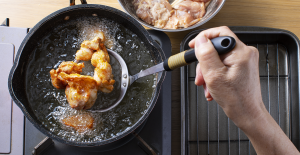Oil and Grease Down the Drain? Here’s Why You Should Think Twice.

With people required to stay in their houses and restaurants limited to take-out, people have turned to their own kitchens to cook for themselves and family. While cooking at home can be a great way to spend time together, be smart when it comes to disposing of any fats, oils, and grease (FOG). If washed down the drain, FOG can be harmful to your home’s and your utility’s sewer pipes.
Grease and oil can stick to the insides of the pipes that carry wastewater from homes and businesses to the wastewater treatment facility. Over time, these build-ups can block the sewer pipes, causing overflows or back-ups in homes and businesses. These build-ups can not only cause problems for local homes and businesses, but have harmful effects on the environment if the overflow enters local rivers, lakes and streams.
ReWa recommends the following methods to avoid grease and oil (FOG) buildups in your pipes:
- Scraping food scraps from dishes and utensils directly into the trash.
- Wiping pots and pans with dry paper towels to soak up FOG residue before rinsing or washing them
- Pouring FOG into a container and allowing it to cool and harden. A variety of everyday items can be used as grease containers such as opened soup or vegetable cans and baby food, pickle or mayo jars.
- Putting your FOG container into the freezer to cool even faster.
- Tossing a cooled, hardened FOG liner or disposal container in the trash.
- Saving old grocery or Ziploc bags to use as can liners so you can reuse your grease can.
To read more about best practices when it comes to keeping your pipes clear and avoiding any blockages, read our article about what’s safe to flush and what should go in the trash.